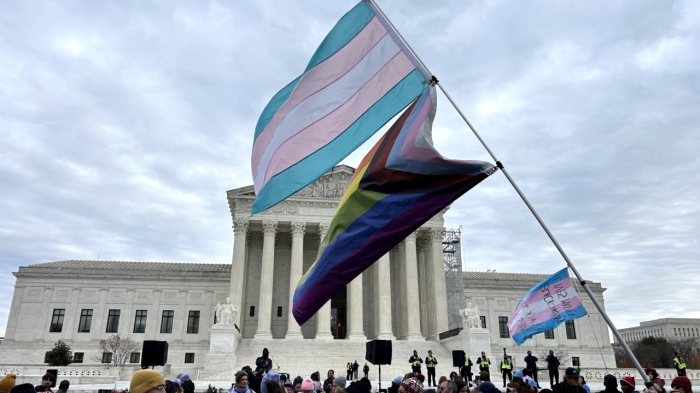
The U.S. Supreme Court has upheld a Tennessee law banning body-mutilating surgeries and hormone drugs for trans-identified minors, affirming a lower court ruling.
In a decision released Wednesday morning in the case of United States v. Skrmetti, the high court ruled 6-3 that Tennessee’s law banning the controversial procedures, also known as Senate Bill 1, does not violate the Equal Protection Clause of the U.S. Constitution.
Chief Justice John Roberts delivered the majority opinion, joined by justices Clarence Thomas, Neil Gorsuch, Brett Kavanaugh and Amy Coney Barrett. Justice Samuel Alito concurred with the judgment.
Roberts rejected the claim by plaintiffs that the law engaged in sex-based discrimination, writing that “the law does not prohibit conduct for one sex that it permits for the other.”
“Under SB1, no minor may be administered puberty blockers or hormones to treat gender dysphoria, gender identity disorder, or gender incongruence; minors of any sex may be administered puberty blockers or hormones for other purposes,” he wrote.
“The plaintiffs fail to note that Tennessee also proclaimed a ‘legitimate, substantial, and compelling interest in protecting minors from physical and emotional harm.’ … And they similarly fail to acknowledge that Tennessee found that the prohibited medical treatments are experimental, can lead to later regret, and are associated with harmful — and sometimes irreversible — risks.”
Roberts emphasized the legitimate medical concerns over the use of puberty blockers for minors, pointing to recent developments in the United Kingdom in which the government banned such drugs for children for the foreseeable future, except for clinical trials.
“This case carries with it the weight of fierce scientific and policy debates about the safety, efficacy, and propriety of medical treatments in an evolving field. The voices in these debates raise sincere concerns; the implications for all are profound,” Roberts added.
“The Equal Protection Clause does not resolve these disagreements. Nor does it afford us license to decide them as we see best. … Having concluded it does not, we leave questions regarding its policy to the people, their elected representatives, and the democratic process.”
Justice Sonia Sotomayor authored a dissenting opinion, joined by Justice Ketanji Brown Jackson and, in part, by Justice Elena Kagan.
“Tennessee’s law expressly classifies on the basis of sex and transgender status, so the Constitution and settled precedent require the Court to subject it to intermediate scrutiny. The majority contorts logic and precedent to say otherwise,” wrote Sotomayor.
“Thus, the majority subjects a law that plainly discriminates on the basis of sex to mere rational-basis review. By retreating from meaningful judicial review exactly where it matters most, the Court abandons transgender children and their families to political whims. In sadness, I dissent.”
Tennessee passed Senate Bill 1 in March 2023, banning healthcare providers from performing genital mutilation surgeries or giving puberty-suppressing drugs to minors exhibiting gender dysphoria.
“The legislature declares that the integrity and public respect of the medical profession are significantly harmed by healthcare providers performing or administering such medical procedures on minors. This state has a legitimate, substantial, and compelling interest in protecting minors from physical and emotional harm,” noted the findings of SB 1.
“This state has a legitimate, substantial, and compelling interest in protecting the integrity of the medical profession, including by prohibiting medical procedures that are harmful, unethical, immoral, experimental, or unsupported by high-quality or long-term studies, or that might encourage minors to become disdainful of their sex.”
Multiple progressive groups sued to strike down the law on behalf of trans-identified children and their families, with the support of the U.S. Justice Department of the Biden administration.
Although a lower court placed a preliminary injunction against the law, a three-judge panel of the 6th U.S. Circuit Court of Appeals allowed the legislation to take effect.
Last September, a 6th Circuit panel ruled 2-1 in favor of the law, with Circuit Chief Judge Jeffrey Sutton, a George W. Bush appointee, authoring the majority opinion.
The Supreme Court heard oral arguments on the case last December, with U.S. Solicitor General Elizabeth Prelogar arguing that the Tennessee ban was discriminatory on the basis of sex.
Nevertheless, Prelogar also said that “we do think there is a real space for states to regulate here” and pointed to West Virginia, where a ban on trans procedures provides an exemption for teenagers who are considered at risk for suicide or other self-harm.
“We don’t think that that means the states are entirely barred from regulating in this space,” she continued. “Obviously, they are grappling with these issues in a variety of contexts.”
In February, the Trump administration dropped its support of the lawsuit against Tennessee.

















